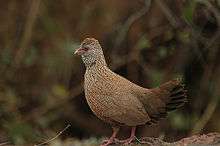Stone partridge
The stone partridge (Ptilopachus petrosus) is a bird of the new world quail family. This largely brown bird, which commonly holds its tail raised, is found in scrubland and lightly wooded habitats, often near rocks, from Kenya and Ethiopia to Gambia (a large part if its range is in the Sudanian Savanna). As traditionally defined, it is the only member of Ptilopachus, but based on genetic evidence this genus also includes the Nahan's "francolin".[2][3][4]
| Stone partridge | |
|---|---|
 | |
| Scientific classification | |
| Kingdom: | Animalia |
| Phylum: | Chordata |
| Class: | Aves |
| Order: | Galliformes |
| Family: | Odontophoridae |
| Genus: | Ptilopachus |
| Species: | P. petrosus |
| Binomial name | |
| Ptilopachus petrosus Gmelin, 1789 | |
English name
There is some confusion in the naming of this species because the name of this bird in many languages translates literally into English as "rock partridge". For instance, in Dutch the species is rotspatrijs, in German - Felsenhenne, in French - poulette de roche - all literal translations of "rock partridge". The bird known as rock partridge in English is actually a member of another genus, the Alectoris graeca. The confusion is further compounded as in some languages Alectoris species are known by names that literally translate as stone partridge. In Dutch, steenpatrijs, in German Steinhuhn; red-legged partridge (A. rufa) being rode steenpatrijs in Dutch. Further complication arises as, particularly within the US, the name "rock partridge" has been used for a variety of Alectoris species and hybrids. The international bird trade, for sport, aviaries and meat, has led to misapplication of various of these common and scientific names. Alectoris and Ptilopachus species are actually very different in size and habits, Ptilopachus being only 20–25 cm long.
Taxonomy
Subspecies
There are four recognized subspecies:
- P. p. brehmi (Neumann, 1908)
- P. p. florentiae (Ogilvie-Grant, 1900)
- P. p. major (Neumann, 1908) - Abyssinian stone partridge - rocky areas of northwest Ethiopia
- P. p. petrosus (Gmelin, 1789) - nominate - Senegal to South Sudan, northern Uganda and northern Kenya
Description
The stone partridge is exceptional among gamebirds in that the female, to human eyes, is showier than the male. Both sexes are predominantly earthy chocolate brown above, with sparse pale cream-grey spotting. The head, neck and chest are paler brown and have broad cream edging to the feathers that gives the bird a scaled appearance. In males the lower chest and belly are orange-cream; in females, very pale cream. Both sexes raise their crown feathers to form a rudimentary crest but the feathers of females are somewhat longer and hence more obvious when raised.
Eggs are pale pink, fading to cream, juveniles are dark chocolate-brown throughout, moulting into adult plumage at several weeks old. In captivity at least, the male plays a major role in both incubation and rearing of the young, offering young small items of food by picking them up, dropping them and calling to the chicks.
Distribution and habitat
Widespread and common throughout its large range, the stone partridge is evaluated as Least Concern on the IUCN Red List of Threatened Species.
Since 2000, the stone partridge has been imported into the United States and Europe, where it is hoped that it will become established in zoos and bird collections.
Philately
- The stone partridge is featured on a 5F stamp of Ivory Coast.
References
- BirdLife International (2012). "Ptilopachus petrosus". IUCN Red List of Threatened Species. 2012. Retrieved 26 November 2013.CS1 maint: ref=harv (link)
- Crowe, T. M., Bowie, R.C.K., Bloomer, P., Mandiwana, T.G., Hedderson, T.A.J., Randi, E., Pereira, S., & Wakeling, J. (2006). Phylogenetics, biogeography and classification of, and character evolution in, gamebirds (Aves: Galliformes): Effects of character exclusion, data partitioning and missing data. Cladistics 22: 495-532.
- Crowe, T. (2010). Phylogenetic affinities of enigmatic African galliforms: the stone partridge Ptilopachus petrosus and Latham's and Nahan's 'francolins' Francolinus lathami and F. nahani. Cladistics 26: 206-206. (Abstract).
- Gill, F, & Donsker, D. eds. (2010). IOC World Bird Names. Version 2.7. Accessed 15 January 2011.
